新概念第一册 第65课
- 格式:ppt
- 大小:1.60 MB
- 文档页数:17
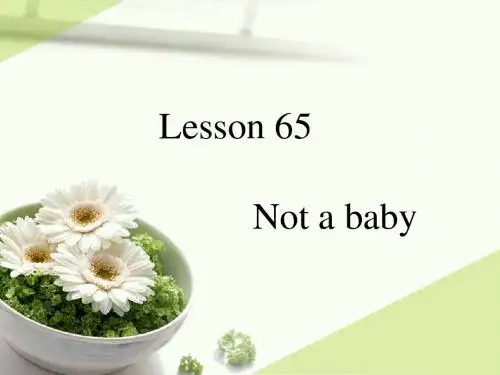
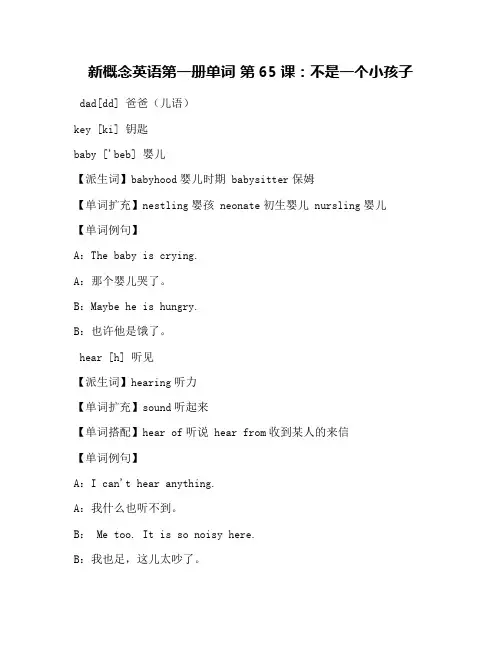
新概念英语第一册单词第65课:不是一个小孩子 dad[dd] 爸爸(儿语)key [ki] 钥匙baby ['beb] 婴儿【派生词】babyhood婴儿时期 babysitter保姆【单词扩充】nestling婴孩 neonate初生婴儿 nursling婴儿【单词例句】A:The baby is crying.A:那个婴儿哭了。
B:Maybe he is hungry.B:也许他是饿了。
hear [h] 听见【派生词】hearing听力【单词扩充】sound听起来【单词搭配】hear of听说 hear from收到某人的来信【单词例句】A:I can't hear anything.A:我什么也听不到。
B: Me too. It is so noisy here.B:我也足,这儿太吵了。
enjoy [n'd; en-] 玩得开心【单词构造】en(表示“使、让”的前缀)+ joy(欢乐)=enjoy(玩得开心)【派生词】enjoyment享受【单词扩充】relish享受【单词搭配】enjoy oneself玩得开心 enjoy the food享用食物【单词例句】A: How is the party last night?A:昨晚的聚会怎么样?B:We didn’t enjoy ourselves at all.B:我们玩得一点儿都不痛快。
yourself [j'self; j-; j-] pron.你自己【单词例句】A: It's a photograph that I took on my vacation last year.A:那是我去年度假时拍的照片。
B:You took it yourself?B:你自己拍的吗?ourselves [a'selvz] pron.我们自己。
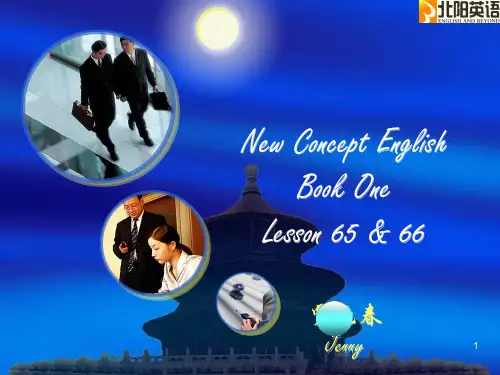
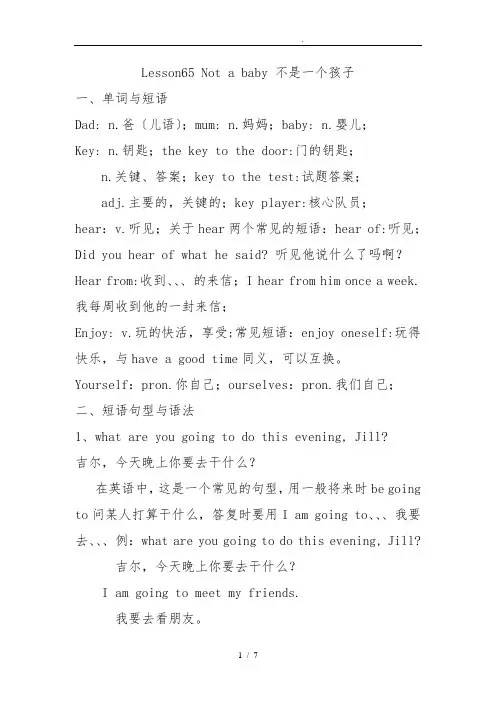
Lesson65 Not a baby 不是一个孩子一、单词与短语Dad: n.爸〔儿语〕;mum: n.妈妈;baby: n.婴儿;Key: n.钥匙;the key to the door:门的钥匙;n.关键、答案;key to the test:试题答案;adj.主要的,关键的;key player:核心队员;hear:v.听见;关于hear两个常见的短语:hear of:听见;Did you hear of what he said? 听见他说什么了吗啊?Hear from:收到、、、的来信;I hear from him once a week.我每周收到他的一封来信;Enjoy: v.玩的快活,享受;常见短语:enjoy oneself:玩得快乐,与have a good time同义,可以互换。
Yourself:pron.你自己;ourselves:pron.我们自己;二、短语句型与语法1、what are you going to do this evening, Jill?吉尔,今天晚上你要去干什么?在英语中,这是一个常见的句型,用一般将来时be going to问某人打算干什么,答复时要用I am going to、、、我要去、、、例:what are you going to do this evening, Jill?吉尔,今天晚上你要去干什么?I am going to meet my friends.我要去看朋友。
What is Tom going to do tomorrow afternoon?明天下午汤姆去干什么?He is going to go shopping with his mum.他要陪她妈妈去逛街。
2、Jill is eighteen years old,mum.妈妈,吉尔都十八岁了。
在本句中需要引起注意的是年龄的表达法。
在英语中表达"……岁",可以只用数词,也可以在数词后面加上years old,初中阶段重点掌握以下两种表达方式即可,例如:"我十三岁。
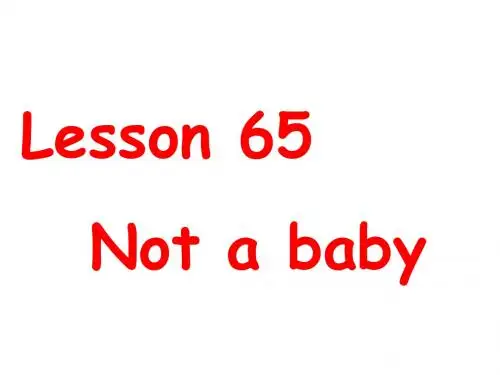

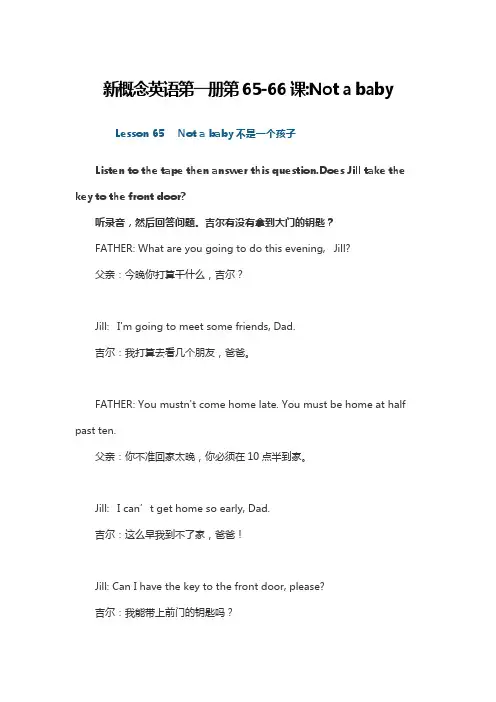
新概念英语第一册第65-66课:Not a babyLesson 65 Not a baby不是一个孩子Listen to the tape then answer this question.Does Jill take the key to the front door?听录音,然后回答问题。
吉尔有没有拿到大门的钥匙?FATHER: What are you going to do this evening, Jill?父亲:今晚你打算干什么,吉尔?Jill: I'm going to meet some friends, Dad.吉尔:我打算去看几个朋友,爸爸。
FATHER: You mustn't come home late. You must be home at half past ten.父亲:你不准回家太晚,你必须在10点半到家。
Jill: I can’t get home so early, Dad.吉尔:这么早我到不了家,爸爸!Jill: Can I have the key to the front door, please?吉尔:我能带上前门的钥匙吗?FATHER: NO, you can't.父亲:不行,你不能带。
MOTHER: Jill's eighteen years old, Tom. She's not a baby. Give her the key. She always comes home early.母亲:吉尔都18岁了,汤姆。
她不是小孩子了。
把钥匙给她吧。
她总早早回家的。
FATHER: Oh, all right!父亲:那么,好吧!FATHER: Here you are. But you mustn't come home after a quarter past eleven. Do you hear?父亲:拿去。
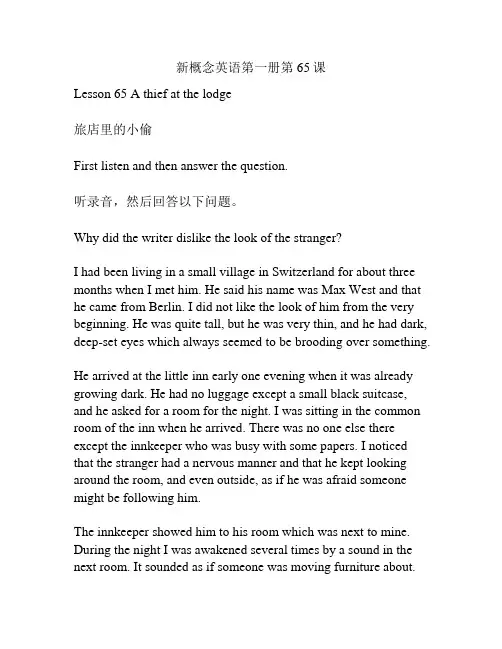
新概念英语第一册第65课Lesson 65 A thief at the lodge旅店里的小偷First listen and then answer the question.听录音,然后回答以下问题。
Why did the writer dislike the look of the stranger?I had been living in a small village in Switzerland for about three months when I met him. He said his name was Max West and that he came from Berlin. I did not like the look of him from the very beginning. He was quite tall, but he was very thin, and he had dark, deep-set eyes which always seemed to be brooding over something.He arrived at the little inn early one evening when it was already growing dark. He had no luggage except a small black suitcase, and he asked for a room for the night. I was sitting in the common room of the inn when he arrived. There was no one else there except the innkeeper who was busy with some papers. I noticed that the stranger had a nervous manner and that he kept looking around the room, and even outside, as if he was afraid someone might be following him.The innkeeper showed him to his room which was next to mine. During the night I was awakened several times by a sound in the next room. It sounded as if someone was moving furniture about.Towards morning the noise stopped and I fell asleep.During breakfast the following morning, I saw the stranger. He was wearing a dark suit and was sitting alone at a table in the corner of the room. He had a newspaper in front of him, but he was not reading it.After breakfast I left the inn to go and work on the land. I did not return until late in the evening. When I entered the common room, I saw that the stranger had gone. Shortly afterwards, the innkeeper came rushing up to me. He was in a state of great excitement because someone had broken into the small locked room behind the inn. The thief had stolen all the food and drink that the innkeeper had stored there. The police were called, but the thief was never caught.I am quite sure that the stranger was the thief, but there was, of course, no way of proving it.。
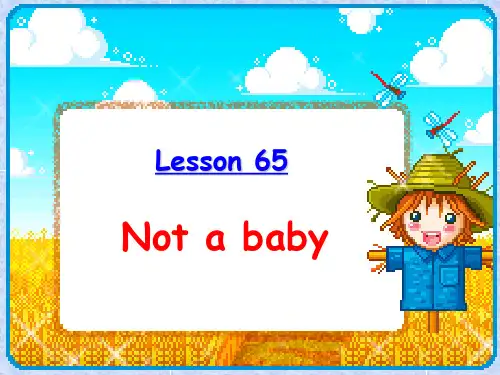
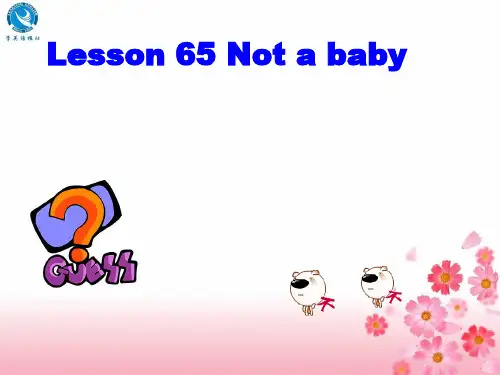
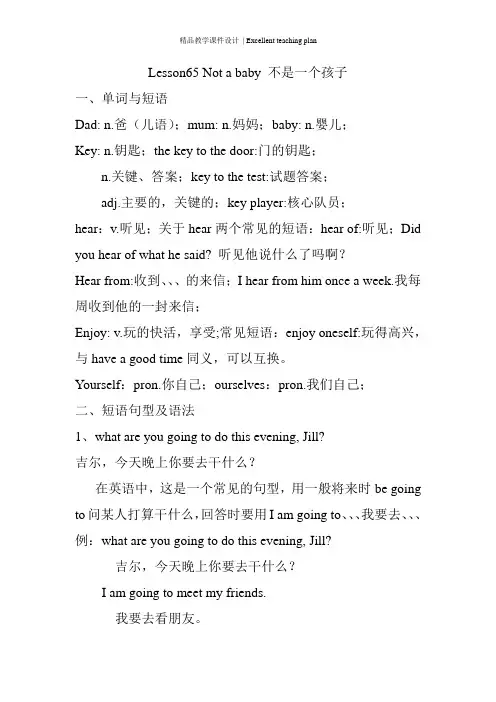
Lesson65 Not a baby 不是一个孩子一、单词与短语Dad: n.爸(儿语);mum: n.妈妈;baby: n.婴儿;Key: n.钥匙;the key to the door:门的钥匙;n.关键、答案;key to the test:试题答案;adj.主要的,关键的;key player:核心队员;hear:v.听见;关于hear两个常见的短语:hear of:听见;Did you hear of what he said? 听见他说什么了吗啊?Hear from:收到、、、的来信;I hear from him once a week.我每周收到他的一封来信;Enjoy: v.玩的快活,享受;常见短语:enjoy oneself:玩得高兴,与have a good time同义,可以互换。
Yourself:pron.你自己;ourselves:pron.我们自己;二、短语句型及语法1、what are you going to do this evening, Jill?吉尔,今天晚上你要去干什么?在英语中,这是一个常见的句型,用一般将来时be going to问某人打算干什么,回答时要用I am going to、、、我要去、、、例:what are you going to do this evening, Jill?吉尔,今天晚上你要去干什么?I am going to meet my friends.我要去看朋友。
What is Tom going to do tomorrow afternoon?明天下午汤姆去干什么?He is going to go shopping with his mum.他要陪她妈妈去逛街。
2、Jill is eighteen years old,mum.妈妈,吉尔都十八岁了。
在本句中需要引起注意的是年龄的表达法。
在英语中表达"……岁",可以只用数词,也可以在数词后面加上years old,初中阶段重点掌握以下两种表达方式即可,例如:"我十三岁。
FATHER: What are you going to do this evening, Jill?Jill: I'm going to meet some friends, Dad.FATHER: You mustn't come home late. You must be home at half past ten. Jill: I can’t get home so early, Dad.Can I have the key to the front door, please?FATHER: NO, you can't.MOTHER: Jill's eighteen years old, Tom. She's not a baby. Give her the key. She always comes home early.FATHER: Oh, all right!FATHER: Here you are. But you mustn't come home after a quarter past eleven. Do you hear?Jill: Yes, Dad.Jill: Thanks, Mum.MOTHER: That's all right. Goodbye. Enjoy yourself!Jill: We always enjoy ourselves, Mum. Bye, bye.New Word and expressions 生词与短语Dadn. 爸(儿语)keyn. 钥匙babyn. 婴儿hearv. 听见enjoyv. 玩得快活yourselfrpon.你自己pron.我们自己mumn. 妈妈本文参考译文父亲:今晚你打算干什么,吉尔?吉尔:我打算去看几个朋友,爸爸。
父亲:你不准回家太晚,你必须在10点半到家。